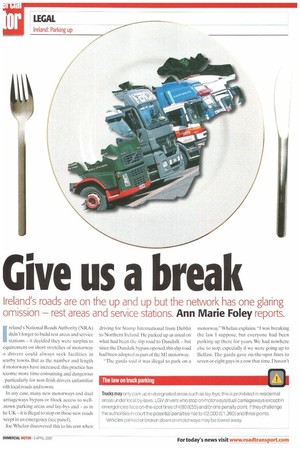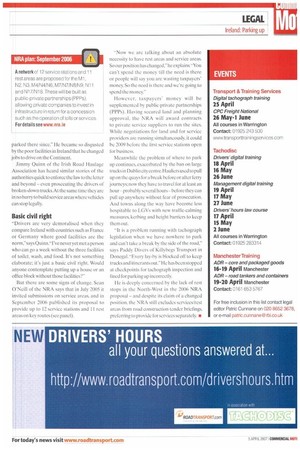Give us a break
Page 38

Page 39

If you've noticed an error in this article please click here to report it so we can fix it.
Ireland's roads are on the up and up but the network has one glaring omission — rest areas and service stations. Ann Marie Foley reports.
Ireland's National Roads Authority (NRA) didn't forget to build rest areas and service stations — it decided they were surplus to equirement on short stretches of motorway is drivers could always seek facilities in learby towns. But as the number and length rf motorw-ays have increased, this practice has )eeome more time-consuming and dangerous particularly fmnon-Irish drivers unfamiliar vith local roads and towns.
In any case, many new motorways and dual arriageways bypass or block access to wellmown parking areas and lay-bys and — as in he UK — it is illegal to stop on these new roads xcept in an emergency (see panel).
Joe Whelan discovered this to his cost when driving for Stamp International from Dublin to Northern Ireland. He parked up as usual on what had been the slip road to Dundalk — hut since the Dundalk bypass opened, this slip road had been adopted as part of the Ml motorway.
"The garda said it was illegal to park on a motorway," Whelan explains. "I was breaking the law I suppose, but everyone had been parking up there for years. We had nowhere else to stop, especially if we were going up to Belfast. The garda gave on-the-spot fines to seven or eight guys in a row that time. I haven't parked there since." He became so disgusted by the poor facilities in Ireland that he changed jobs to drive on the Continent.
.Jimmy Quinn of the Irish Road Haulage Association has heard similar stories of the authorities quick to enforce the law to the letter and beyond — even prosecuting the drivers of broken-down trucks. At the same time they are moo hurry to build service areas where vehicles can stop legally.
Basic civil right
"Drivers are very demoralised when they compare Ireland with countries such as France or Germany where good facilities are the norm," says Quinn."I've never yet met a person who can go a week without the three facilities of toilet, wash, and food. It's not something elaborate; it's just a basic civil right. Would anyone contemplate putting up a house or an office block without those facilities?"
But there are some signs of change. Sean O'Neill of the NRA says that in July 2005 it invited submissions on service areas, and in September 2006 published its proposal to provide up to 12 service stations and 11 rest areas on ke., routes (see panel).
"Now we are talking about an absolute necessity to have rest areas and service areas. So our position has changed," he explains. 'You can't spend the money till the need is there or people will say you are wasting taxpayers' money. So the need is there and we're going to spend the money."
However, taxpayers' money will be supplemented by public-private partnerships (PPPs). Having secured land and planning approval, the NRA will award contracts to private service suppliers to run the sites. While negotiations for land and for service providers are running simultaneously, it could be 2(X)9 before the first service stations open for business.
Meanwhile the problem of where to park up continues, exacerbated by the ban on large trucks in Dublin city centre. Hauliers used to pull up on the quays for a break before or after ferry journeys; now they have to travel for at least an hour —probably several hours— before they can pull up anywhere without fear of prosecution. And towns along the way have become less hospitable to LGVs with new traffic-calming measures, kerbing and height barriers to keep them out.
It is a problem running with tachograph legislation when we have nowhere to park and can't take a break by the side of the road," says Paddy Divers of Killybegs Transport in Donegal. "Every lay-by is blocked off to keep trucks and itinerants out." He has been stopped at checkpoints for tachograph inspection and fined for parking up incorrectly.
He is deeply concerned by the lack of rest stops in the North-West in the 2006 NRA proposal — and despite its claim of a changed position, the NRA still excludes services/rest areas from road construction tender briefings, preferring to provide for services separately. •






























































































































































































